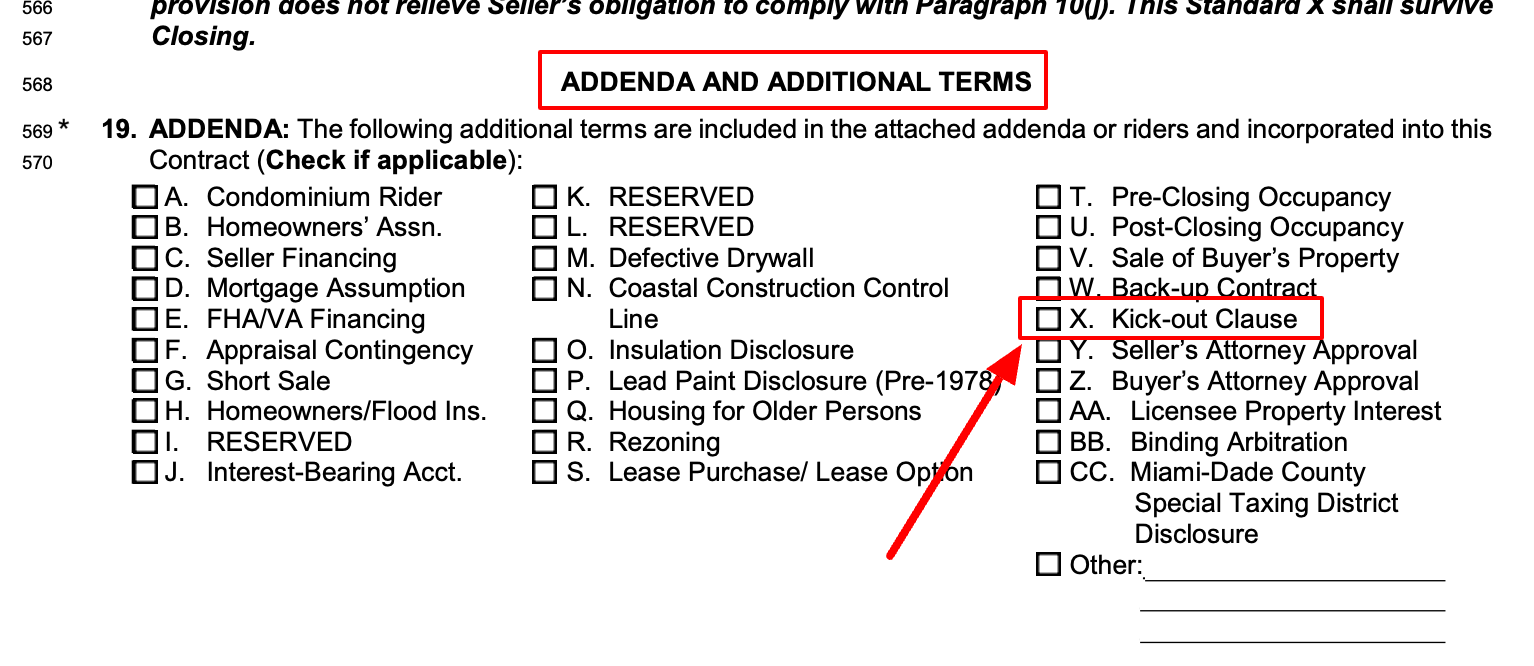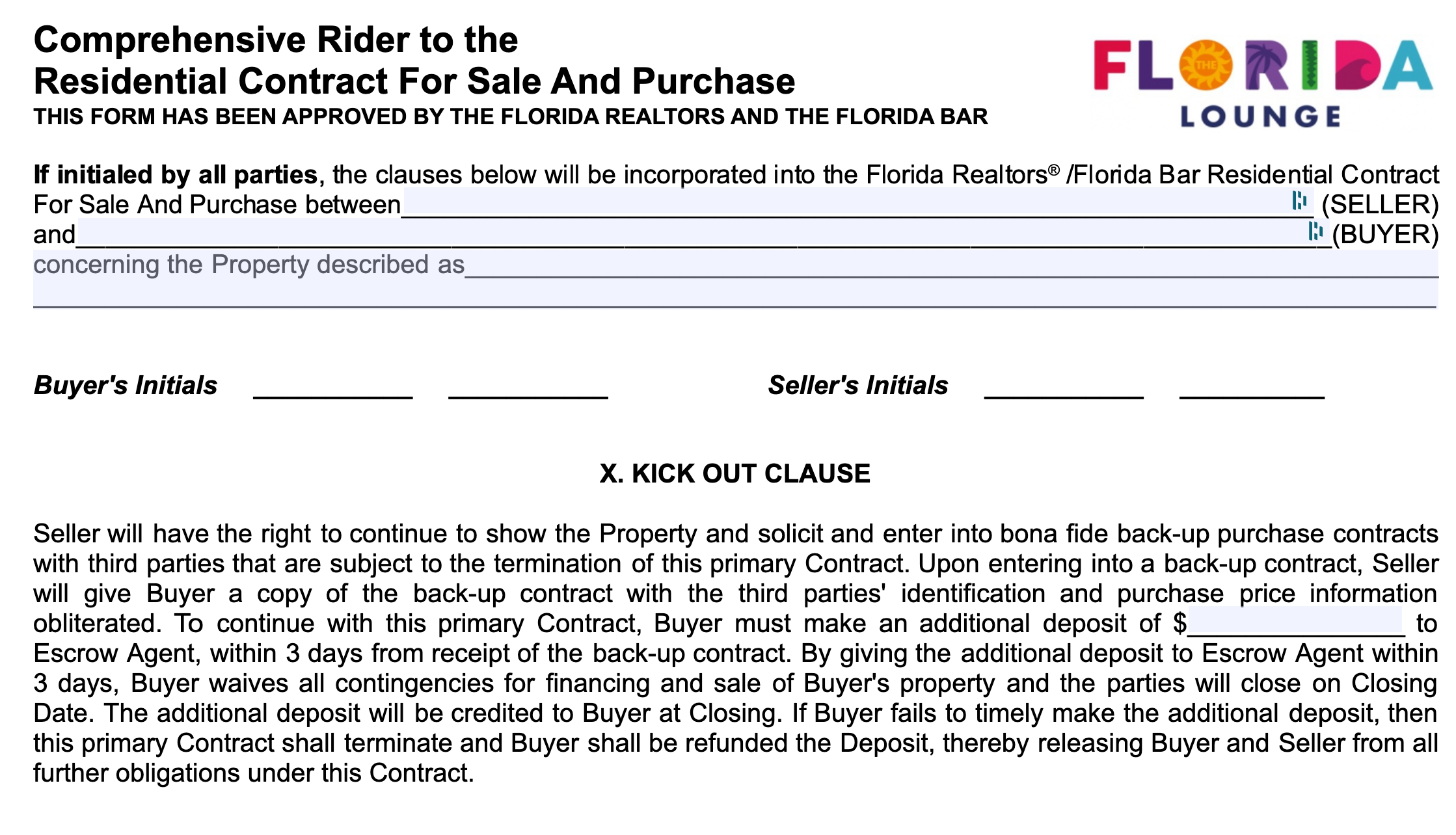The Florida real estate market is very rich and there are many options for clauses to support a wide variety of negotiations. On a day-to-day basis, we don't use all the possibilities and we often fail to use or even ignore the existence of interesting options that can help us when making an offer or even counter-offering an offer we have received but are not comfortable accepting.
That's why I decided to write this article to present a clause that can be used both in offers that we know are not the best but that represent our vision of a negotiation as well as giving us a very powerful tool to counter-offer when we are not sure that it is the best offer we can receive.
Contents
HideAt the end of the standard sales contract in Florida, known as the As Is, we have a list of contingencies or clauses that we want to include in a negotiation, among them the Kick-Out Clause that we will explore in this article.

In the real estate market, it is common for people to make an offer with what are known as "contingencies". These are conditions that must be met before the buyer goes ahead with the purchase of the house. If the conditions listed in a contingency are not met, then the buyer can withdraw from the purchase and will receive their deposit money back.
For example, prudent buyers always include the home inspection contingency. This clause says that the buyer has the right to have the house professionally inspected before concluding the sale. Based on the results of this inspection, the buyer can request repairs or withdraw from the deal altogether.
Buyers can include any contingencies they wish when making an offer to buy a house. If the seller accepts the buyer's offer, these contingencies will be included in the sales contract.
The most common are:
- Inspection
- Financing
- Evaluation
Except for other conditions, once a seller accepts the buyer's offer, they should take the house off the market. They cannot formally show the house or accept legally binding offers from other buyers, because they have already signed a contract to sell the house to someone else. This is true even if the sales contract includes contingencies.
This can put sellers in a difficult situation. If a buyer exercises their contingencies and withdraws from the sale, the seller will have to put his house back up for sale and start all over again. This can be a problem if the real estate market cools down, if the length of time a house has been listed jeopardizes future offers, or if the seller simply needs to sell the house and move on.
A kick-out clause tries to address this problem from the seller's point of view. It is a related clause that the seller can include in a contingent sales contract.
It allows the seller to continue formally showing the house and accepting new offers, ideally looking for one that doesn't include certain contingencies.
If they receive an offer with no contingencies, the seller can accept it instead of the existing sales contract. This effectively "kicks out" the original buyer and replaces them with the new offer.
In doing so, this gives the seller a measure of protection. It allows them to accept a contingent offer while still looking for a better deal. It also allows them to continue marketing the house in case contingencies go wrong and they have to find a new buyer. With this clause, they won't have to start all over again because the house never came off the market.
In most cases, if not all, an eviction clause includes what is known as a "right of refusal". This means that if the seller receives a non-contingent offer for the house, they have to give the original buyer notice and the opportunity to change their offer.
In most cases, the buyer has 72 hours to decide whether to remove their contingencies and proceed with the purchase anyway. If not, the original sale is canceled. The buyer receives the deposit money back and the seller can proceed with the second offer. If so, the second offer is annulled and the original contract will now ignore the conditions relevant to the purchase.
It is also relatively rare for sellers to write a broad get-out clause that allows them to accept any better offer. Few buyers would accept that. For example, it would be rare to see a buyer accept an eviction clause based solely on accepting a higher sale price or waiving an essential contingency such as a home inspection.
Instead, most eviction clauses address specific, high-risk contingencies in the sales contract. The most common is what's called a home sale contingency. But depending on how the market is doing, the seller may accept an offer that he thinks is not so good but include a kick-out clause so that during the period between the offer and the closing of the deal he can receive a better offer, this can happen when the buyer asks for very significant price concessions.
With a home sale contingency, the buyer has a certain period of time to sell their own home before completing the purchase of the new home. Normally, this period is 90 days. If the buyer is unable to sell their home within the allotted time, then the sales contract is void and the seller has to put their home back up for sale. Buyers like this contingency because it allows them to avoid the risk of carrying two mortgages, and many rely on the money from the sale of their old house to pay for the new one.
Although home sale contingencies are rare in a hot market, even in a market favorable to buyers, few sellers will accept such a contingency without an eviction clause.
- Triggering of the Kick-Out Clause:
- The Kick-Out clause is triggered when the seller receives a contingent offer from a buyer, but reserves the right to accept a better offer from another buyer if one arises.
- To trigger the clause, the seller must notify the current buyer of the new offer and provide a deadline for the buyer to decide whether to remove the contingency or terminate the contract.
Example: John receives an offer to buy his house in Miami, but the offer is subject to the sale of the buyer's current property. While waiting for the contingency to be removed, John receives a better offer from another buyer. He then notifies the first buyer of the new offer and gives him a deadline to make a decision.
- Execution of the Kick-Out Clause:
- If the current buyer does not remove the contingency within the established timeframe or chooses to terminate the contract, the seller can accept the other buyer's better offer.
- It is important to follow legal and contractual procedures when executing the clause, ensuring that all notices and deadlines are properly complied with.
Example: If the first buyer doesn't manage to sell his property within the allotted time or chooses not to remove the contingency, John can accept the other buyer's better offer and proceed with the sale of the house.
By fully understanding the workings of the Kick-Out clause and the associated legal requirements, brokers and clients can use this provision effectively to maximize desired results in Florida real estate transactions.
The answer is... it depends.
As a buyer, you should never accept an expulsion clause for basic rights and responsibilities. Even if it is legal for the seller to request it, you should never allow a kick-out clause for contingencies such as home inspection, rights of refusal, financing and appraisal. These are essential for protecting yourself.
You should also never accept a kick-out clause based simply on the seller receiving a better offer. Even though you may have made a strong offer, you don't want the seller to use your offer to get a better one.
However, a kick-out clause can be very valuable when it comes to high-risk contingencies, such as the sale of a house. In this case, it can allow each party to get part of what they want, rather than having to give up an all-or-nothing deal.
If the buyer needs a high-risk contingency, this allows their offer to go ahead when the seller might not otherwise accept it. At the same time, a kick-out clause can allow the seller to accept an attractive offer without having to take on too much risk in the process.
Kick-out clauses are relatively rare in a heated sellers' market because most sellers can afford to turn down most contingencies straight away. In more normal markets, however, they can be very valuable in specific circumstances.
In the image below I show the current text proposed by the Florida Realtors Organization in conjunction with Florida Bars

As this clause can offer protection to sellers when the offers received offer too much risk of continuity due to existing contingencies or by asking for very expensive concessions from the seller:
- Continued search for buyers:
- The Kick-Out clause allows sellers to continue looking for buyers, even after they have accepted a contingent offer from a buyer.
- This is especially useful in a competitive market where sellers may receive multiple offers, as the clause gives them the flexibility to accept a better offer if one comes along.
Example: Maria listed her house in Orlando and received a contingent offer from a buyer. While waiting for the contingency to be removed, she continues to show the house and receives a better offer from another buyer. With the Kick-Out clause, Maria can accept the new offer without losing market time.
- Protection of Financial Interests:
- By reserving the right to accept a better offer, the Kick-Out clause protects the sellers' financial interests, allowing them to maximize the sale value of their property.
- This prevents sellers from being stuck with an offer below market value in case a better offer comes along during the contingency period.
Example: John receives an offer below market price for his house in Miami, but decides to accept it due to a lack of other options. However, with the Kick-Out clause in place, he can continue looking for buyers and eventually receives a higher offer, guaranteeing a better financial return.
The Kick-Out clause plays a key role in protecting sellers' interests during the process of selling and negotiating real estate in Florida. By offering flexibility and financial protection, this clause allows sellers to make informed decisions and maximize the sale value of their properties.
Below, I examine in detail the buyer's responsibilities with respect to removing the contingency and the consequences of failing to comply with the terms set forth in the clause, as well as reference the Florida statutes that outline these rights and obligations:
- Buyer's responsibilities:
- The buyer has a responsibility to act in good faith when considering and responding to the contingency set out in the contract.
- This includes taking reasonable and timely measures to remove the contingency within the specified period, otherwise the contract may be terminated.
Example: Ana signed a contract to buy a house in Tampa with an inspection contingency. It is her responsibility to hire an inspector within the established time frame and make an informed decision based on the results of the inspection.
- Removing the Contingency:
- The buyer must take steps to remove the contingency within the period stipulated in the contract, otherwise the seller may be entitled to trigger the Kick-Out clause.
- Removing the contingency usually involves providing documentation that proves that the established conditions have been met, such as obtaining financing or completing the inspection. Remember that these two contingencies do not normally create the right scenario for a buyer to accept the inclusion of the Kick-Out clause
Example: If the inspection contingency is included in the contract, the buyer must review the inspection report within the established timeframe and decide whether to proceed with the purchase or terminate the contract.
- Consequences of Non-Compliance:
- If the buyer fails to comply with the terms set out in the Kick-Out clause, they may be subject to legal consequences, such as the loss of the cash deposit or even legal action for breach of contract.
- In addition, the seller may have the right to accept a better offer from another buyer, should it arise during the unfulfilled contingency period.
Example: If the buyer does not remove the contingency within the period stipulated in the contract, the seller can terminate the contract and retain the cash deposit as compensation for the damage caused by the breach of contract.
By understanding the buyer's rights and obligations in the context of the Kick-Out clause and following the proper procedures set forth in Florida statutes, brokers and clients can ensure a fair and legally sound negotiation. This promotes transparency and trust between the parties involved and helps avoid unnecessary disputes during the process of buying and selling real estate in Florida.
Below, I will discuss these legal procedures in detail, including deadlines, notifications and possible outcomes:
- Deadlines and notifications:
- Real estate contracts in Florida usually specify deadlines for the removal of contingencies and other steps in the purchase process.
- The Kick-Out clause can set specific deadlines for the buyer to remove the contingency and for the seller to make a decision on whether to accept a better offer.
- It is crucial that all notifications relating to the application of the clause are made in writing and within the time limits established in the contract.
Example: If a buyer receives a better offer and wishes to trigger the Kick-Out clause, he must notify the seller in writing within the period stipulated in the contract, providing all the relevant details of the new offer.
- Legal developments:
- If a buyer does not remove the contingency within the established timeframe or if the seller does not accept a better offer within the terms of the Kick-Out clause, there may be legal ramifications.
- These developments can include the termination of the contract, the withholding or return of cash deposits and possible legal action for breach of contract.
Example: If a buyer does not remove the contingency within the stipulated time, the seller can rescind the contract and retain the cash deposit as compensation for the damage caused by the breach of contract.
Below, I will provide suggestions and tips for brokers and clients on how to effectively use this clause to maximize desired results, as well as reference the Florida statutes, regulations and recommended practices that guide its proper implementation:
- Clear and transparent communication:
- It is essential to clearly communicate the terms and conditions of the Kick-Out clause from the beginning of the negotiation process.
- Everyone involved must understand their rights, obligations and the possible consequences if the clause is triggered.
Example: During the negotiation, the broker should explain in detail how the Kick-Out clause works and what deadlines and procedures are involved.
- Flexible trading:
- Brokers and clients should be open to reasonable negotiations and compromises when including the Kick-Out clause in the contract.
- This can include flexible deadlines for removing contingencies and termination clauses that protect both parties from possible unforeseen events.
Example: A buyer may agree to allow a shorter contingency removal period in exchange for a reduction in the purchase price.
- Active Market Monitoring:
- Brokers should closely monitor the market to identify competing offers that could trigger the Kick-Out clause.
- This allows customers to be prepared to make quick and informed decisions if a better offer comes along.
Example: A broker can use market analysis tools to monitor price trends and listing activity to help clients make informed decisions.
- Legal compliance:
- It is essential to ensure that all aspects of the transaction comply with Florida statutes, regulations and best practices.
- This includes following the deadlines and procedures established for the application of the Kick-Out clause.
Example: Brokers should be aware of the legal requirements for written notices and contingency removal deadlines as set forth in Florida Statutes.
By implementing these best practices when dealing with the Kick-Out clause, brokers and clients can maximize the desired results in Florida real estate transactions. These practices promote an efficient, transparent and legally sound negotiation, contributing to the satisfaction of all parties involved.
A kick-out clause is a provision in a real estate contract that allows sellers to accept a contingent offer while continuing to show the property and receive offers. If they accept a second offer, the buyer can remove their contingencies or be "kicked out" in favor of the new offer.
Did you like the article? Keep an eye on our blog! Looking to live or invest in real estate in Florida? Check out the list of houses for sale in Florida that we've selected for you!
|
Getting your Trinity Audio player ready...
|
Leo Martins
My role is to create an environment for people to connect with Real Estate in Florida






